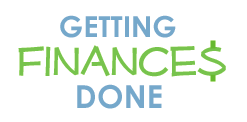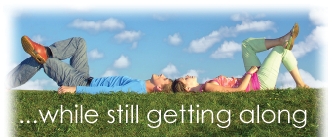Two Common Objections To Using A Cash Budget
Written by SamPeople have a big resistance to using cash in their budget. We’ve become so accustomed to using debit and credit cards that using cash is like a novelty. I wanted to address a couple of the concerns people have and why they don’t outweigh the huge benefits of using cash.
Objection #1: It’s Inconvenient
One of the main objections I hear about cash is that it’s inconvenient. It’s true that using cash may take a little longer than using credit cards. In fact, the credit card industry is well aware of this and emphasizes this point. Have you ever seen the TV commercial with graceful music playing as people use their credit card to check out. Suddenly someone pulls out cash. The needle scratches and the music stops as the person fumbles around with their money and all the other people look on disapprovingly.
That commercial presents a powerful emotional image.
The fact is, cash isn’t that much more inconvenient. In fact, some cash transactions are faster than credit card transactions. Even more important, you want to remember the effect using cash will have on your budget. Think of all the time and pain avoided by not overspending and not having to agonize every month while trying to reconcile your accounts. That pain is much worse than the slight inconvenience caused by using cash.
Objection #2: My cash might get lost or stolen
First let’s talk about cash getting lost. There is no more chance of you losing your cash than there is of losing your credit cards and/or other items in your purse or wallet with that accompanying inconvenience and risk.
To prevent getting your cash stolen, you do want to be careful not to flash around gobs of cash. It’s helpful to have cash in envelopes for this purpose. It allows you to just use the cash you need. You can also make the cash ready and easily accessible before you go into the store so you don’t have to flip through all of it in the store. To do so, take out the money you’ll be using and put it in a convenient and easily-accessible pocket separate from the rest of your cash. No one will be the wiser.
Emily misplaced some of her cash one month and while that’s never a welcome occurrence, it’s much better to lose a couple hundred dollars once than to perpetually overspend $500 every month like we were doing before switching to cash. This was a one-time occurrence in the 5 years since we’ve been using cash.
One more suggestion that could help prevent lost or stolen cash is to withdraw money from your bank in chunks. Instead of taking all the money out once during the month, take half out at the beginning and half out mid-way through the month. This minimizes the possible amount you could lose if that misfortune occurred.
Try it to believe it
In the end, some people have to try using cash to really experience the benefits and become converted. You can come up with excuses all day about why you shouldn’t use cash. Go ahead and do that and I’ll talk to you in a year and find out that your budget still doesn’t work and you’re still living paycheck to paycheck.
I personally was a big skeptic and only saw the huge benefits of cash after doing a cash budget for a few months. Now I’d never go back.
Posted in 12 Weeks to Fiscal Fitness, Budgeting, Cash | 5 Comments »


 Subscribe via email
Subscribe via email  Become a fan
Become a fan Subscribe via RSS
Subscribe via RSS Follow me
Follow me
June 7th, 2010 at 2:51 pm
Hi there, do you know when more of this series will be published?
June 7th, 2010 at 3:27 pm
David, I’m almost done with week 5 and will be posting it this week. Sorry for the break between weeks 4 and 5.
June 21st, 2010 at 7:53 pm
1) As someone who works in retail, cash is slower. You have to count it, I have to count it, I have to put it away in the till and then count out the change. Then, you should count the change and make sure you got the right ammount.
Compare this to the card, I press E for Electronic transaction, it loads the amount onto the swipe pad, shows you the ammount being charged, you swipe your card and put in your pin – DONE
2)
If I lose my card, it costs $10 to replace.
If i lose $100 of cash, it lose $100.
You can’t steal a card, it holds no value without the card holder.
You can steal cash.
Other benefits:
1) If you pay for something on card and lose the recepit, you can prove your purchase with your transaction history (often free online)
if you pay cash, and lose your receipt, you have no evidence you bought that item from the shop.
2) Cards let you track your spending. You can see everywhere you spent your money in a month, rather then just one big withdrawel of cash.
July 4th, 2011 at 3:57 am
Of course the plastic is faster! If your goal is to get people to spend 20% more than they would with cash, you need to make it very easy. It has to give people a false sense of freedom.
My wife and I moved to an almost cash-only system one year ago. I resisted, because I thought it would be so inconvenient, but I love it now! We know how much cash we need for our various categories, and when I go to the grocery store and make large purchases, the handling of all the twenties shows me what we’re spending. That’s now the feeling of freedom I prefer — the freedom of knowing that we’re spending money we’ve budgeted and already have.
By the way, one of the few places where we still use credit cards is at gas stations. Paying at the pump is a whole lot quicker, and we fill up every time, anyway, so we wouldn’t save anything by paying cash.
January 18th, 2012 at 2:22 pm
A year and a half late, but in response to William’s assertions:
1) Who cares if it’s slower, the people standing in line behind me? They can continue to impatiently overspend while I’m comfortable knowing for certain that I’m not buying anything I can’t afford.
2) Yes, it only costs $10 to replace a card, but that’s not taking into account the potential fraudulent transactions that are charged on the lost or stolen card. You can say it holds no value without the cardholder, but in the past 12 years of using a credit card or bankcard I have had only about half of the cashiers ask me for ID or even look at the name on the card.
3) I’ve tried a couple of times to use a bank statement as proof of purchase, and it almost never works. Stores want a store-issued receipt that is itemized and that they can verify in their system, not a printout from your bank’s website that can be altered.
4) You can track your spending with cash as well, it just requires a bit more time and work. When it comes to financial stability, the extra effort is rarely wasted.
All that being said, I should admit that I’m playing devil’s advocate a bit. I tend to use my checkcard to pay for purchases, but not without being aware of my budget and the limits of my spending. Using credit cards I got myself into tens of thousands of dollars of debt and only recently rid myself of the shackles — if I had been buying on a cash basis it never would have happened!
$0.02